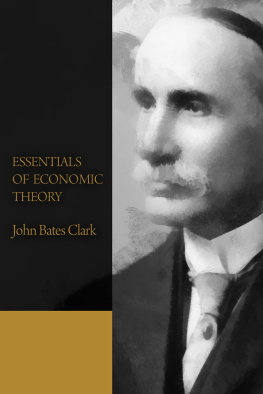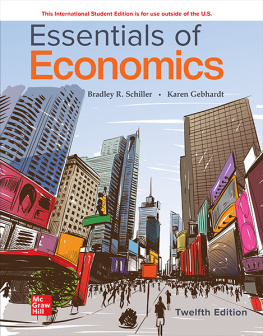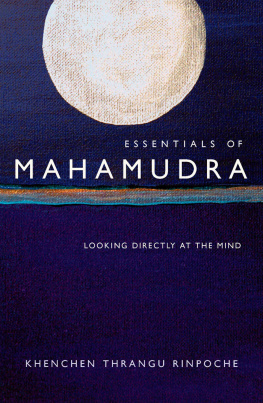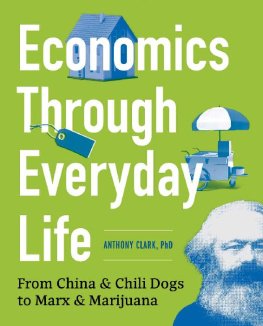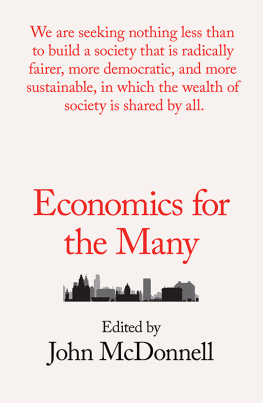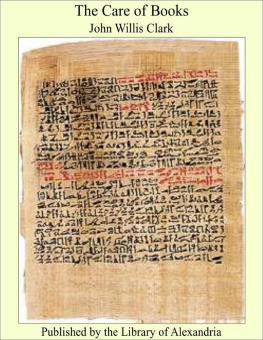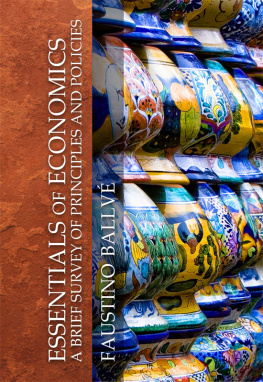John Bates Clark - Essentials of Economics
Here you can read online John Bates Clark - Essentials of Economics full text of the book (entire story) in english for free. Download pdf and epub, get meaning, cover and reviews about this ebook. year: 2013, genre: Politics. Description of the work, (preface) as well as reviews are available. Best literature library LitArk.com created for fans of good reading and offers a wide selection of genres:
Romance novel
Science fiction
Adventure
Detective
Science
History
Home and family
Prose
Art
Politics
Computer
Non-fiction
Religion
Business
Children
Humor
Choose a favorite category and find really read worthwhile books. Enjoy immersion in the world of imagination, feel the emotions of the characters or learn something new for yourself, make an fascinating discovery.
- Book:Essentials of Economics
- Author:
- Genre:
- Year:2013
- Rating:4 / 5
- Favourites:Add to favourites
- Your mark:
- 80
- 1
- 2
- 3
- 4
- 5
Essentials of Economics: summary, description and annotation
We offer to read an annotation, description, summary or preface (depends on what the author of the book "Essentials of Economics" wrote himself). If you haven't found the necessary information about the book — write in the comments, we will try to find it.
Essentials of Economics — read online for free the complete book (whole text) full work
Below is the text of the book, divided by pages. System saving the place of the last page read, allows you to conveniently read the book "Essentials of Economics" online for free, without having to search again every time where you left off. Put a bookmark, and you can go to the page where you finished reading at any time.
Font size:
Interval:
Bookmark:
We have now before us a few principles of so general a kind that they apply to the economy of the most primitive state as well as to that of the most advanced. It is not necessary that men should live in any particular relation to each other, in order that, in creating and consuming wealth, they should exemplify these principles. They would do this even though they never came into touch with each other, but lived, as best they could, each man on his solitary farm. Laws of this general kind result from mans relation to nature, and not at all from the relation of different men to each other. Let a man keep wholly aloof from other men, apply his labor directly to nature, and he can produce wealth of the various kinds that we have described. He can secure food, clothing, and other things for his own use, and he can make tools to help him in securing them. He will appraise the consumers goods according to the law of what has been called final utility or, in another view, effective specific utility, and he will also test the comparative usefulness of his various tools by an appeal to the law of final or specific productivity.
Social Economy the Chief Subject of Study.We care most to know how an organized society produces and uses its wealth, and in making this inquiry we encounter at once phenomena that are not universal. The civilized society creates its wealth cooperatively, by the joint action of its various members; that is, it proceeds by means of a division of labor and an exchanging of products. Moreover, it has, in some way, to share the sum total of its gains among its various members. It has to apportion labor among different occupations for the sake of collective production, which is a grand synthetic operation whereby each man puts something into a common total which is the income of all society. It has, further, to divide the grand total into shares for its different membersan analytical operation in which each man takes something out of the aggregate for his personal use. This is distribution in the narrower sense of that termthe apportionment among the members of a civilized society of the fruits of production. In the wider sense the term also includes the apportionment of the sacrifices incurred in the joint production. Distribution, as thus defined, is the element that appears in economic life in consequence of social organization. This is a secondary element, indeed; for man, nature and their relations and interactions are the primary facts, and the relations of men to each other come logically after these. Social organization, however, is so transforming in its effects as to reduce to small proportions the amount of attention it is worth our while to devote to the economy of the primitive types of life. It is necessary to make some study of that economy, for it is thus that we place before ourselves the fact that there are universal economic laws and perceive distinctly the nature of some of the more important of them.
Facts Peculiar to Socialized Industry.The term Political Economy denotes a science of industry as thus socialized, for it is a science of the wealth which is produced in an organized way by the people of a more or less civilized state. The general truths which we have thus far stated apply to such an economy, indeed, but they also apply to the wealth-creating and wealth-consuming processes of uncivilized peoples, and even of isolated individuals who have no dealings with each other. They are truths of Economics in the unrestricted sense, and we have now to study the special truths of Political Economy. When production goes on by division of labor, as when one man works at one occupation and another at another, phenomena appear that do not appear in more primitive life; and still others appear when, within each occupation, there is a division of functions between the laborer and the capitalist, as is the case whenever one set of men furnish tools of production and another set do the work. The special laws of this highly developed economic system require far more extended study than do those more general laws which are common to it and simpler systems. We now continue to recognize the universal and basic truths which have been stated in the foregoing chapters and proceed to the study of the special principles which apply only to organized economic life.
Specialized Production the Means of Diversified Consumption.As the kinds of goods that we individually make become fewer, the things which we get and use become more numerous and variedsuch is the law of economic specialization. Society as a whole produces an infinite variety of things, and the individual member of it secures for himself goods of very many kinds. The typical modern worker is, in his production, a very narrow specialist, but in his consumption he is far less a specialist than was the rude hunter who was able to enjoy only the few goods which he himself produced. The modern workers tastes are omnivorous, for he has developed an immense variety of wants and, through social organization, he has acquired the means of satisfying many of them.
The Position of Individuals in the Producing Organism.When we say that production has been socialized, we mean something very far-reaching. We mean that an organization has grown up in which men are members or parts of members, and that this great organization has undertaken to do the productive work for all the individuals that compose it. For the first time we now recognize a sociological fact among the premises of economic science. When men, whose predecessors may have lived in isolated families or in a society organized for defense or for the mere pleasures of association, now develop a truly economic society, the individual depends on other individuals as well as on nature for the supply of his wants. Economic independence gives way to interdependence, because the fortune of each man is largely dependent, not merely on his own efforts, but on the relations which he sustains to other men. Simple laws of nature still largely control his income, but social laws also have a certain control over it.
Exchanges in their Primitive Stage.The exchanging of products is, of course, the process with which the organization begins, and this process is introduced by easy and natural stages. The man who at first makes everything for himself develops a particular aptitude for making some one thing; and, though he may still continue to make most things for himself, he finds it advantageous to barter off a part of the supply of the one article for the making of which he is especially well fitted. He seeks out a neighbor whose special aptitude lies in a different direction and who has a surplus of some other article. It may be that one is a successful fisherman and the other is, by preference, a maker of clothing, and that they can get a mutual benefit by an exchange of food for raiment.
The Intermediate Type of Exchanges and the Final One.In the next stage a man becomes wholly a specialist, making one kind of product only and bartering it away for others. It might seem, at the first glance, that differentiation has now done its full work; but it is very far from having done so. Making one complete good for consumption is still a complex operation, which can advantageously be subdivided in such a way that one man produces a raw material while another works it up into a useful shape. A gain may be made by a further division of the manufacturing process, whereby the first worker makes only the rawest material, another fashions it somewhat, a third carries the process farther, and a fourth or a still later one completes it. In modern industry the material must often pass through very many hands before it is ready to be made over to the consumer. Each man in the series puts a touch on it and passes it on to his successor.
Font size:
Interval:
Bookmark:
Similar books «Essentials of Economics»
Look at similar books to Essentials of Economics. We have selected literature similar in name and meaning in the hope of providing readers with more options to find new, interesting, not yet read works.
Discussion, reviews of the book Essentials of Economics and just readers' own opinions. Leave your comments, write what you think about the work, its meaning or the main characters. Specify what exactly you liked and what you didn't like, and why you think so.

